Medicine by day, merengue by night
Video produced by UK Public Relations and Strategic Communications. To view captions for this video, push play and click on the CC icon in the bottom right-hand corner of the screen. If using a mobile device, click on the "thought bubble" in the same area.
LEXINGTON, Ky. (Feb. 5, 2024) – Upstairs in the University of Kentucky Johnson Center’s Blue Studio on a Wednesday night, a crowd begins to gather — first a trickle, then smaller groups. Soon, a line develops outside the door as participants check in. It’s nearing 8 p.m., and this collection of UK students and employees is here for one person: UK Campus Recreation and Wellness fitness instructor and student Joseph Stuart.
As class is about to begin, Stuart walks the room, welcoming nervous newcomers and diehard regulars, and letting them know what to expect over the next hour — dancing, sweating and most importantly, fun.
It’s time to get started. “Are you guys ready to Zumba?” Stuart shouts, pumping his fist in the air. The crowd cheers as he begins to preview a few dance moves for the warm-up.
He starts the music — this week, leading off with “Dance the Night” by Dua Lipa. Almost instantly, any anxious expressions turn to smiles and laughter as the class follows his lead. Such is the magic of group fitness, and of Stuart in particular, says Lindsay Thomayer, fitness coordinator for UK Campus Rec.
“He has stage presence,” Thomayer said. “He’s got this big personality that fills up the entire studio, and he’s full of energy from the first minute of class to the last minute. He’s one of those electric personalities that everyone wants to know.”
Zumba’s tagline is “Ditch the workout, join the party” and Stuart delivers on that promise. It’s a job that requires a lot of mental and physical energy; instructors memorize specific choreography and then come to class prepared to be teachers, ringleaders, and entertainers — all to make the experience of physical fitness something to look forward to, not dread.
As the class rolls on, the room heats up, and participants dash to their water bottles in between songs. At 9 p.m., they’re done for the night, sweaty and in good spirits.
This includes Stuart — who says that while he’s teaching, he’s giving 110% the whole hour. Now, it’s time for him to go home, unwind and try to get as much sleep as he can to prepare for a busy day in his full-time role: as a 4th-year medical student in the UK College of Medicine.
*****
Born in the Philippines, Stuart moved to Lexington 13 years ago and attended Tates Creek High School. From an early age, he had considered the idea of becoming a physician one day.
“I was good at science; I love taking care of people,” he said. “So there was always this idea of working in health care, but it wasn’t really until I moved here and got exposed to the practice of medicine that I thought, ‘You know, this might be for me.’”
After high school, he chose the University of Kentucky, majoring in agriculture and medical biotechnology in the UK Martin-Gatton College of Agriculture, Food and Environment. This life sciences degree has an intense academic focus on genetics and applied research, and it’s a popular option for students who have an interest in pursuing a career in health care or veterinary medicine further down the road.
The program’s director of undergraduate studies, Lou Hirsch, Ph.D., estimates that nearly 40% of their alum are pre-med, and credits the program’s smaller class size as a main factor for student success.
“The small size of our program – less than 200 students – allows our faculty and staff to know our students by their first name and personally mentor them toward their career,” Hirsch said. “In addition to exposing our students to cutting-edge science, we pair them with faculty mentors after their first semester, and require participation in hands-on research and presenting in public research symposia.”
“It was one of the best decisions I’ve made that prepared me for medical school and life in general,” Stuart said. “Not everyone learns the same way. And in the program, we are given plenty of time and resources to figure out our personal and academic goals, connect with our peers, and get to know our mentors.”
After graduating with his bachelor’s degree in 2018, Stuart applied and was accepted into the UK College of Medicine class of 2024. Early on, he already had an idea of the area of medicine he’d like to pursue: obstetrics and gynecology.
“I grew up around women,” he said. “My grandmother raised me; I grew up around my female cousins and my aunts. My mom is such a strong impact in my life that I really wanted to give back to those people who have supported me throughout the years.
“And,” he added, “I love babies!”
The first two years of medical school focuses the core principles of medicine — students are attending classes and labs, learning the basics of medicine while practicing skills they’ll use in a future clinical setting. In year three, they begin clinical clerkships, rotating through a variety of specialties and settings to gain an understanding of different medical disciplines: internal medicine, emergency medicine, neurology, surgery, pediatrics, OB/GYN, psychiatry and family medicine. By year four, students are choosing their medical specialties and creating a curriculum of acting internships and electives that will help prepare them for their chosen residencies.
In addition to his required rotations, Stuart also gained experience by working with physicians in gynecologic oncology, maternal-fetal medicine, radiation oncology, diagnostic radiology and women’s health in Georgetown.
It was a clinical experience in Stuart’s third year — his favorite memory — that solidified his choice to pursue OB/GYN. He laughs and says it might sound cliché: witnessing the miracle of birth for the first time.
“Just the beauty and joy of that was probably one of the most magical moments in my med school career,” he said. “Not only did it solidify that I wanted to go into OB/GYN, but it made me realize, this is something that women go through every single day.”
Stuart cites a number of mentors who guided him throughout his time in the UK College of Medicine, including faculty member Wendy Jackson, M.D. She first met Stuart through his involvement with the UK chapter of the Student National Medical Association, an organization committed to supporting underrepresented minority medical students, addressing the needs of underserved communities, and increasing the number of clinically excellent, culturally competent and socially conscious physicians.
“I immediately recognized a level of enthusiasm that I describe as ‘contagious,’” Jackson said. “He’s a warm, personable, outgoing student.”
UK HealthCare OB/GYN Coy Flowers, M.D., agrees, having worked with Stuart for two years at the UK Women’s Health – Georgetown practice.
“Joseph initially came to our clinic for his 3rd-year clerkship,” Flowers said. “He was ‘green,’ but full of energy and optimism, and was committed to women’s health.”
Stuart also worked directly with Jackson in the clinical space, where she works as an OB/GYN for Kentucky Children’s Hospital. His easy demeanor proved tremendously beneficial when working with patients, she says.
“He creates an environment that puts patients at ease in his presence,” she said. “We spent time together in the clinical area delivering patient care to those with pediatric and adolescent needs, and those characteristics created a space for each of my patients to feel comfortable under Joseph’s care. I have no doubt that he is going to be a wonderful obstetrician/gynecologist, serving women through both the delivery of patient care as well as a voice of advocacy.”
For his fourth year, Stuart came back to the Georgetown clinic. Not only did he display maturity and knowledge when working with patients, but he also took an active role in helping younger medical students, says Flowers.
“He spent considerable time mentoring the 3rd-year students as they sought to learn more about the unique health care issues facing women during their lifespans,” Flowers said. “Joseph will make an excellent OB/Gyn and will undoubtedly leave his mark in our field.”
****
While he was earning his undergraduate degree, Stuart says that fitness became a priority for him. But he quickly found that many of the common methods of working out — like running, using cardio equipment or lifting weights — held no appeal. He was willing to give group fitness at UK Campus Rec a try, and found the consistency, structure and community feel of fitness classes immediately spoke to him.
“The only time I felt like I was truly working out and having a good time was when I was taking group fitness classes,” he said. “And one class that stood out for me was Zumba.”
Launched in 2001 by a Colombian dancer and choreographer, Zumba is a cardio fitness class that focuses heavily on Latin-inspired dance. These days, the class format is a staple at most gyms; the format is taught in more than 200,000 locations in 180 countries. Aside from enjoying the format, Stuart said he was also inspired in particular by the instructor — a fellow student named Will.
“I loved his class, went every single week,” Stuart said. “And I finally realized, ‘Hey, this might be something I would want to do.”
In 2016, he earned his Zumba certification, and quickly auditioned to become an instructor with Campus Rec. But before hiring him, Thomayer and other members of the fitness staff gave him notes on how to improve his class. Stuart took that feedback and ran with it, auditioning again just six weeks later and landing the job. His willingness to listen, learn and apply those suggestions is indicative of his work ethic, says Thomayer.
“He didn’t walk away, didn’t shy away from it,” Thomayer said. “He could have left the audition and been like, ‘Maybe they’re not for me.’ I feel like constructive criticism is hard for some to take on, but he owned it and challenged it.”
Stuart began teaching for UK Campus Rec in 2017. Since then, he’s been a regular feature of the group fitness schedule, building up an incredible following of UK students and employees. At times, his classes have grown so large that Johnson Center staff have folded up the removable wall that splits the two group fitness studios to create one massive space that can handle the capacity of his class.
“I feel like Joseph is really, truly authentically himself,” Thomayer said. “I think that’s what has helped him build his following. You want to see what he’s doing to do next; that’s what draws people to him. And you can tell he truly has a passion for teaching and for fitness.”
Though he took a break from teaching for the first year of medical school, Stuart proved he had the ability to successfully handle his classwork and incorporate teaching back into his schedule. Since year two, he’s been teaching consistently twice a week or more on top of his class and clinical schedule. The days of his surgical clerkships — with their early morning start times — were especially hard.
“You’ve been at the hospital since 5 a.m., and you don’t get off until 6:30 or 7 p.m.,” he said. “And then, to come back and teach at 8 p.m. … it can be difficult. But it doesn’t feel like a job for me. It’s something that I enjoy, it’s something that I love, and it’s a way to get my creative juices flowing. So it doesn’t matter if I’ve been on my feet the whole day. I’m going to put on a face, I’m going to be enthusiastic, I’m going to be excited, and I’m going to teach you Zumba.”
*****
Stuart has just four months left before he can add “Dr.” in front of his name. He’s applied and interviewed for more than a dozen residencies, and will find out where he’s matched at noon on the third Friday of March — an annual, nationwide event for medical students known as “Match Day.” Thinking ahead to his future goals, he cites his experience at UK Women’s Health OB/GYN – Georgetown as a model for his future practice.
“Hopefully, after four years of residency, I’m a general OB/GYN, surrounded by family, and building up my own community and my practice,” he said. “I really love the idea of being in a smaller community, but supported by a big university, similar to the Georgetown office. They’re out in the community serving the underserved, but they’re backed by a strong university — UK — and I want my practice to be like that.”
Though he’d love to continue to teach Zumba beyond UK, Stuart understands that the demands of a residency and future medical training likely won’t leave him much spare time. In the meantime, he’s making the most of his last semester at UK, teaching Zumba three nights a week at the Johnson Center: Tuesdays, Wednesdays and Thursdays at 6 p.m.
“It’s very sad; it’s been a part of my life for the last six years,” he said. “I’m going to miss the participants. I’m going to miss coming up with dances and choreography. But we move on, and unfortunately, this may be my last time teaching.”
The benefits of group classes, Stuart says, go far beyond just physical fitness. For many attendees, the social aspect is equally as important.
“Lots of participants have said that Zumba has been a part of their college career, and they’ve made friends coming to classes,” he said. “Health is not just physical fitness; it’s mental, emotional, social. If you’re coming from a small town in Kentucky going to a big city like Lexington, it’s something that is comfortable and welcoming.”
Thomayer agrees. “Group fitness classes are something that people can be very timid to try,” she said. “But once you break that threshold and walk into that space, it can be the most welcoming, rewarding community that you’re involved in.”
For new and returning students who are intrigued by the idea of group fitness but are wary of attending, Stuart’s advice is simple: give it a try.
“I think it’s important to try out different things to figure out what you enjoy,” he said. “For me, it was trying out different workout classes to see what worked for me. And you can definitely apply that mindset not just in your fitness and wellness, but for life in general.”
Visiting UK’s Johnson Center or Alumni Gym to work out qualifies for UK Invests. Learn more about UK Invests here.
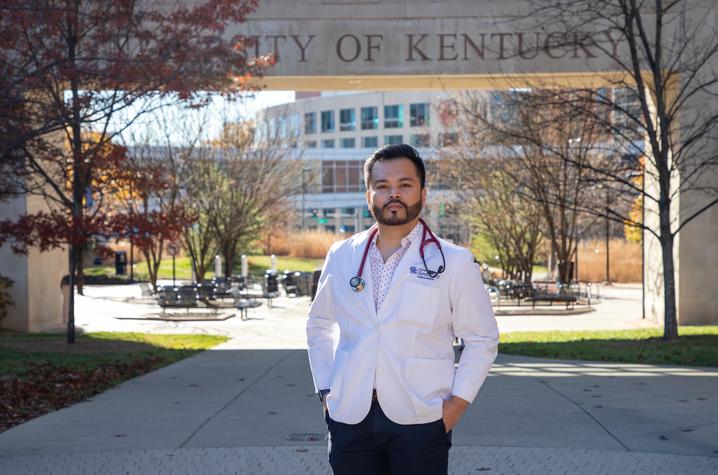
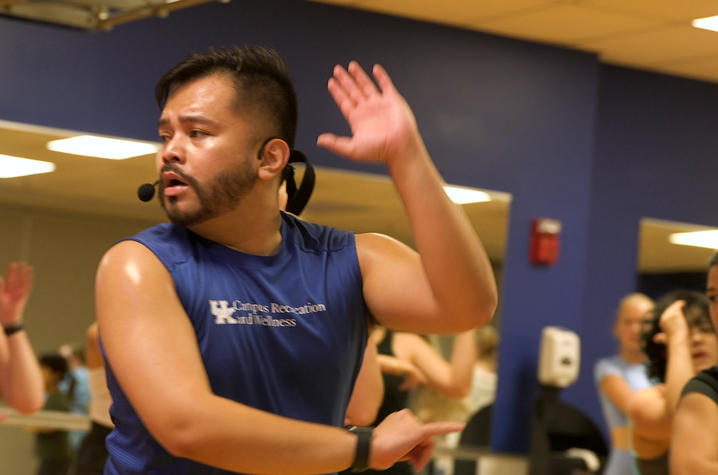
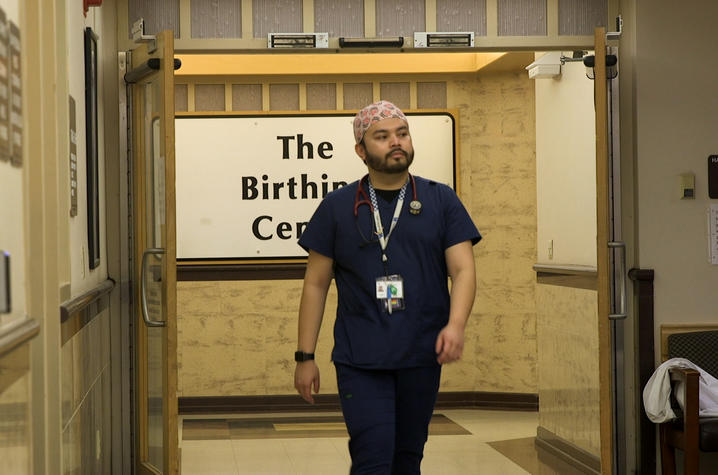
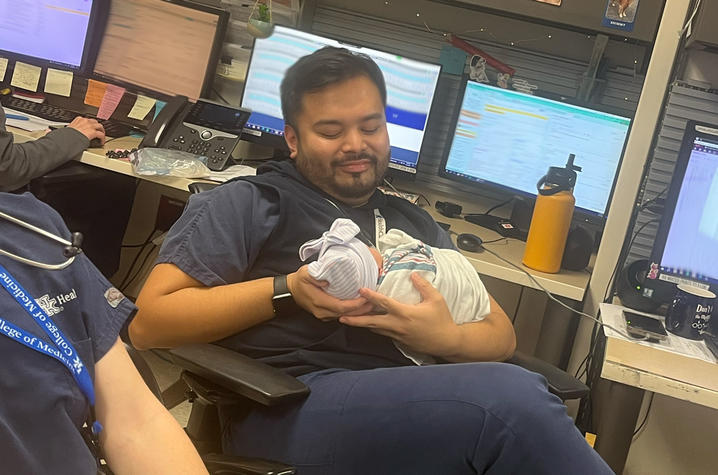
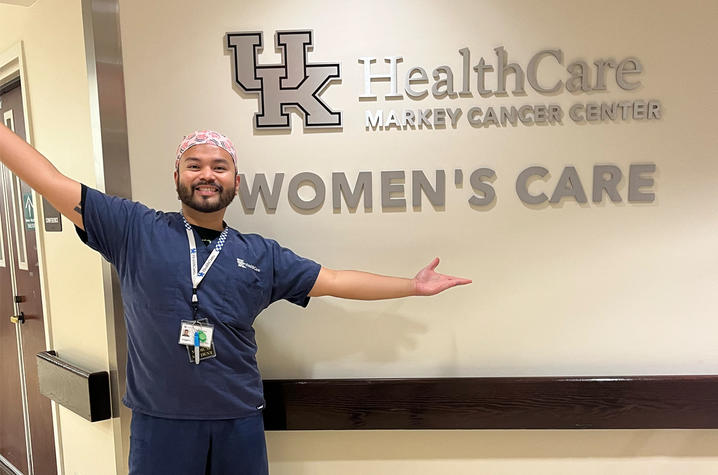
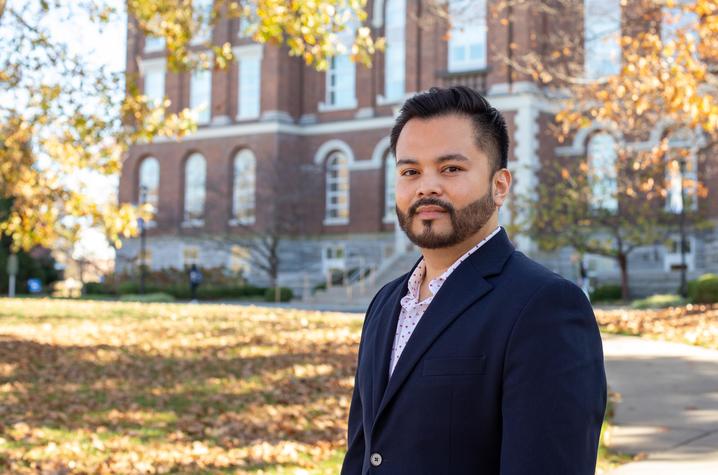
As the state’s flagship, land-grant institution, the University of Kentucky exists to advance the Commonwealth. We do that by preparing the next generation of leaders — placing students at the heart of everything we do — and transforming the lives of Kentuckians through education, research and creative work, service and health care. We pride ourselves on being a catalyst for breakthroughs and a force for healing, a place where ingenuity unfolds. It's all made possible by our people — visionaries, disruptors and pioneers — who make up 200 academic programs, a $476.5 million research and development enterprise and a world-class medical center, all on one campus.




